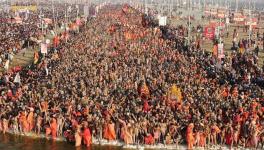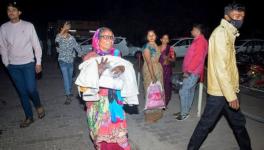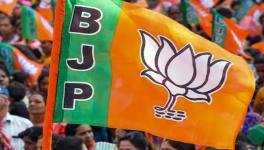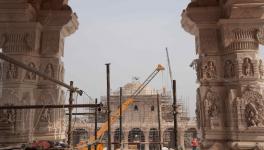Uttar Pradesh Says Law is Religion Neutral, Facts Tell Another Story
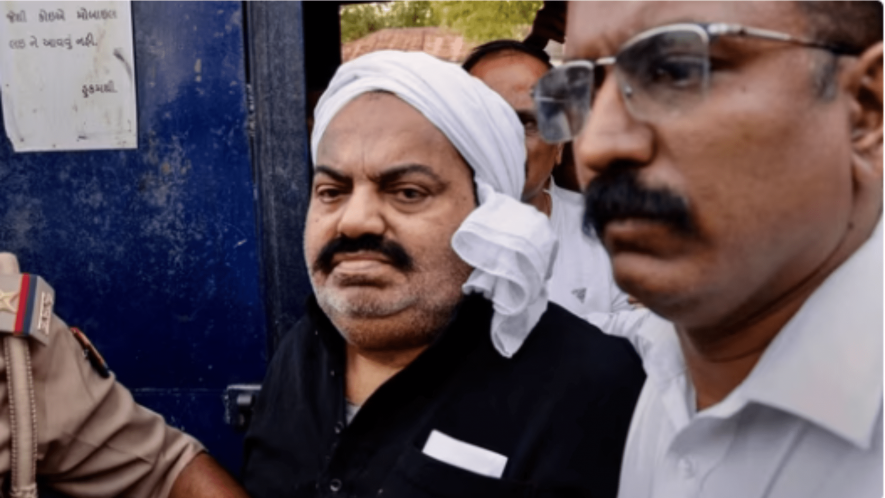
UP Police with jailed-mafia Atiq Ahmed outside Sabarmati Central Jail as he is being shifted to Prayagraj, in Ahmedabad. Image Courtesy: PTI
If we see encounter killing number 183 by Uttar Pradesh Police—in which ex-Member of Parliament and don Atiq Ahmed’s son Asad and his aide were killed—and the subsequent killings of Atiq and his brother Ashraf in police custody through the prism of Chief Minister Yogi Adityanath’s “encounter policy”, we would fail to understand the larger political calculus behind this policy. To fully comprehend these events and Adityanath’s much-advertised war against the mafia, we need to dig a bit deeper.
On 13 November 2021, during the run-up to the 2022 Assembly election in Uttar Pradesh, Union Home Minister Amit Shah raised the Hindutva pitch by offering voters the choice between two sets of what he abbreviated as JAM—his party’s Jan-Dhan Yojana, Aadhaar card and mobile phones for all versus Mohammad Ali Jinnah, Mohammad Azam Khan and Mukhtar Ansari. He was referring to the founder of Pakistan, a well-known Samajwadi Party leader and a gangster turned politician.
Several weeks later, on 25 February 2022, at a public meeting held at Rampur Khas in Pratapgarh, Shah targeted previous Uttar Pradesh governments for having patronised the “mafia” and cited Atiq as well as Khan and Ansari. Throughout this campaign, at various other places, Shah, Bharatiya Janata Party president JP Nadda, and other party leaders routinely mentioned these names to suggest that the Yogi government had cracked down on hardened criminals.
Not once since then has the Chief Minister uttered the name of any other alleged criminal when talking of crime in Uttar Pradesh. The issue has been so framed by him and his party that big crime in Uttar Pradesh is now synonymous with gangsters who happen to be Muslims. It is not to suggest that no Muslims are involved in crime, but the communal framing of this issue shows that in recent events, as in many other actions of the Yogi government, there is more than meets the eye.
On 14 April, the Samajwadi Party media cell tweeted a list of alleged criminals with many cases against them. It included Kuldeep Singh Sengar from Unnao, who faces 28 cases, Brijesh Singh from Varanasi with 106 cases, Dhananjay Singh of Jaunpur with 46, Raja Bhaiyya or Raghuraj Pratap Singh from Pratapgarh with 31, and others. The Samajwadi Party also asked: “Are they special to Yogi [Adityanath]? Actually, they all belong to the same caste as Yogi. Hence, they are still alive, committing crimes...” There appears to be an element of truth to this allegation, as only one person from the above list featured in a “most wanted” list released by the Uttar Pradesh Police a few days back.
Muslims Under Pressure
Showing Muslims as “the problem” is part of the BJP’s larger electoral game-plan in Uttar Pradesh. In this plan, the Chief Minister is the ideal person to “set things right” in “his own way”—unencumbered by the rule of law. Consequently, even ordinary Muslims are cornered on various issues under the Yogi regime. In the last few years, vigilante groups, which mainly target Muslims and Dalits, have been given selective protection by the police. They are allowed to target communities and consequently polarise the public space.
While the State professes that the law is religion-neutral, the facts tell a different story. In its vicious onslaught on those who protested against the Citizenship Amendment Act 2019, the Uttar Pradesh Police entered homes in Muslim neighbourhoods and destroyed properties. Properties were also seized, an action the Supreme Court later declared illegal. The death count in police action against the protesters was 22—all Muslims.
From bans on cow slaughter to allegations of love jihad, Hindutva ideology is directed against a particular community. The National Security Act (NSA) is used as a strong instrument to wage an ideological offensive by booking people allegedly involved in cow slaughter or “trafficking”. Between January 2018 and 2020, the Allahabad High Court quashed orders passed under the NSA in more than 70% of cow slaughter-related cases. All of the accused were Muslims.
Uttar Pradesh was among the first States to pass a law against forced conversions, and it is routinely used to harass and jail Muslim men in interfaith relationships. BJP leaders have accused Muslim men of “corona jihad”. Such day-to-day discrimination, which is far more insidious, has increasingly marginalised Muslims. It has become acceptable that the majority community have a right to feel offended by what Muslims wear or eat or who they marry. Slowly, extra-judicial violence, often with religious insinuations, has become the norm in the governance of Uttar Pradesh. These violent practices are then turned into slogans and cleverly deployed in the electoral arena.
Role of Media
The framing of Muslims as dangerous is aided and abetted by the media, mainly the vernacular and electronic media, which frequently associates them with violence. Crimes or alleged crimes by an Atiq or a Mukhtar get extensive coverage in ways geared to strengthen in the viewer’s mind an image of the community as “violent”. Any information about Muslims in the public eye for any reason is blown out of proportion. This criminalisation of the community—against the “victimhood” of the other—is the consequence of clever media spins. The only thing that matters to the powers that be is the opinion people form after they have been exposed to such coverage.
It is against this backdrop that when some political leaders raised questions over the manner in which Atiq and Ashraf were killed in police custody, they were accused of playing “vote-bank” politics. When some Muslims raised questions over these killings, they were charged with supporting criminals from their community. There has been a lot of celebration on social media and praise for Yogi for “decimating” the mafia—and that is exactly what he would want. A large section of the majority community has come to see the mafia through the prism of religion. The narrative the BJP has weaved that all big criminals are Muslims has coloured people’s perception, yielding the Yogi regime rich political dividends. In fact, the Uttar Pradesh Chief Minister’s version of enforcing law and order is becoming so popular that, wary of his rising political graph, this time, the BJP’s central leadership has refrained from responding to the recent killings.
Today, because of the way the political culture of Uttar Pradesh has developed, everything is seen through the prism of caste and community. A few years back, when gangster Vikas Dubey was killed in another questionable “police encounter”, all prominent non-BJP political leaders questioned it. Members of the Brahmin community across the State objected to the manner of his killing. For many social media users, Dubey was a Brahmin “tiger” whose killing was another atrocity in a State led by a “Thakur” Chief Minister. The whole country saw that resurgence of Brahmin pride and victimhood. Many Brahmins went to the extent of threatening to topple the government of a “Thakur” Adityanath. Nobody—neither the BJP nor the media—objected to their open support for an alleged gangster.
But in today’s Uttar Pradesh, Muslims cannot afford to be similarly critical of the government. At most, they can talk about the rule of law and the Constitution, and still, they are accused of siding with a criminal. They are the ones always called upon to prove their loyalty to the State and whatever it does to “enforce” the law. Against this backdrop, the All India Pasmanda Muslim Mahaj, like some other Muslim groups, was quick to say that the killing of Atiq is related to the crime world and has nothing to do with ordinary people: “Mafia and Bahubali have no religion. If law and order is disturbed, we will be the only ones who will suffer.”
The author is a professor at the Department of Political Science, Aligarh Muslim University. The views are personal.
Get the latest reports & analysis with people's perspective on Protests, movements & deep analytical videos, discussions of the current affairs in your Telegram app. Subscribe to NewsClick's Telegram channel & get Real-Time updates on stories, as they get published on our website.













